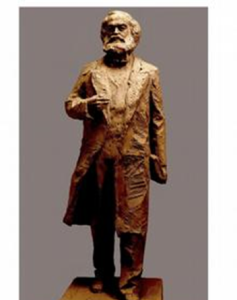 A 4.4-meter monumental bronze statue of Karl Marx presented by China as a gift to the great thinker’s hometown, was erected in Trier Friday ahead of celebrations to mark the 200th anniversary since Marx’s birth.
A 4.4-meter monumental bronze statue of Karl Marx presented by China as a gift to the great thinker’s hometown, was erected in Trier Friday ahead of celebrations to mark the 200th anniversary since Marx’s birth.
Designed by famous Chinese sculptor Wu Weishan, the statue arrived last month in the Western German town Trier, where Marx was born, and is scheduled to be officially unveiled to the public on May 5, 200 years to the day Karl Marx was born in 1818.
200 years ago, on 5 May 1818, was born the greatest ever man – Karl Marx. In the words of Engels: “Marx was above all a revolutionary, and his great aim in life was to cooperate … in the overthrow of capitalist society and the state institutions which it has created, to cooperate in the emancipation of the modern proletariat, to whom he was the first to give a consciousness of its class position and its class needs, a knowledge of the conditions necessary for its emancipation. In this struggle he was in his element, and he fought with a passion and tenacity and with a success granted to few”. Although his contribution ranges over a very wide field, as do his political activities, there are two discoveries he made which were truly ground-breaking and served to enlighten humanity. First, he discovered the law of evolution in human history, coming to the conclusion that the production of the immediate material means of life and consequently the given stage of economic development of a people or of a period forms the basis on which state institutions, the legal principles, the art and even the religious ideas of the people in question have developed and out of which they must be explained, instead of exactly the contrary, as was previously attempted. “It is not the consciousness of human beings which determines their being, but, on the contrary, it is their social being which determines their consciousness”.
Second, Marx discovered the law of development of the capitalist mode of production and the bourgeois system of society produced by it. His discovery of surplus value suddenly shed light on the darkness in which other economists had been groping. In the words of Engels,” two such discoveries would have been enough for any life. Fortunate indeed is he to whom it is given to make even one, but on every single field which Marx investigated … he made independent discoveries”.
In addition to his scientific work, this genius devoted himself, with energy, determination and passion, to organising and guiding the proletariat of the whole of Europe and North America in its struggle for social emancipation. And, for this, he was the most hated man, with the bourgeoisie and its hangers-on hurling abuse at him. None of this deflected him from his scientific work or from his political activity aimed at overthrowing capitalism. And, he did all this work in the midst of dire poverty and poor health. And it must be said to the credit of his lifelong friend and collaborator, and co-founder of the science of Marxism, Friedrich Engels, that without the latter’s support, as Marx himself admitted on more than one occasion, he would have been crushed and gone under.
LALKAR greets the second centenary of Marx’s birth with joy and gratitude for the genius of a great man who belonged to the whole of progressive humanity. A fuller article on his work and his life will appear in the next issue of LALKAR.
Comments are closed, but trackbacks and pingbacks are open.